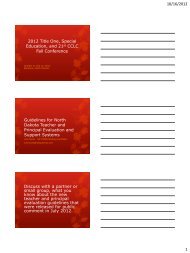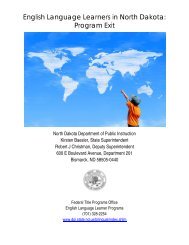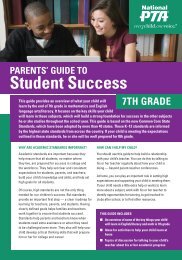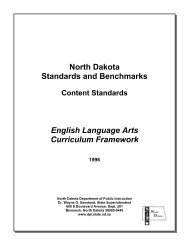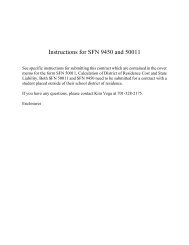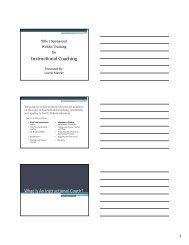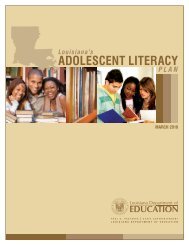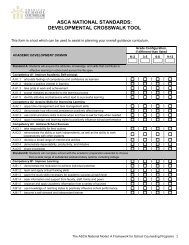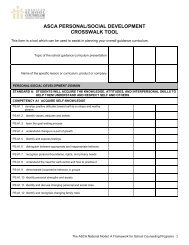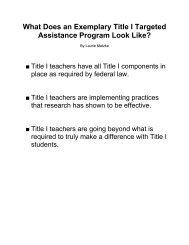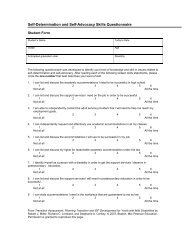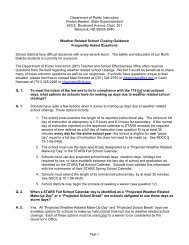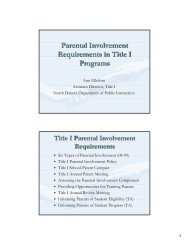IVN Training Session - North Dakota Department of Public Instruction
IVN Training Session - North Dakota Department of Public Instruction
IVN Training Session - North Dakota Department of Public Instruction
You also want an ePaper? Increase the reach of your titles
YUMPU automatically turns print PDFs into web optimized ePapers that Google loves.
<strong>Department</strong> <strong>of</strong> <strong>Public</strong> <strong>Instruction</strong><br />
Dr. Wayne G. Sanstead, State Superintendent<br />
600 East Boulevard Avenue, Dept. 201, Bismarck, ND 58505-0440<br />
Guidance for the<br />
2012-2013 Consolidated Application for Federal Title I Funding<br />
Final Due Date to Submit Application: August 31, 2012<br />
Please review the following information carefully. This document includes updates for completing the<br />
Title I portion <strong>of</strong> the consolidated application.<br />
Key Information<br />
� The 2012-2013 Consolidated Application for Federal Title Funding was opened on the STARS<br />
effective May 7, 2012. School personnel may now start inputting information.<br />
� Grant Period – The grant period for spending Title I funds through this consolidated application is<br />
July 1, 2012 through June 30, 2013.<br />
� Electronic Application URL – The Consolidated Application for Federal Title Funding can be<br />
accessed at https://secure.apps.state.nd.us/dpi/stars/Login.aspx.<br />
� Board Approval – The Consolidated Application for Federal Title Funding must be printed out and<br />
approved at a school board meeting. The application cannot be submitted without a date indicating<br />
when it was approved by the school board.<br />
Issues to Address Before Completing the Consolidated Application<br />
1. Districts need to decide whether they will complete the consolidated application without<br />
carryover amounts or wait until these amounts are available. School districts have two options<br />
available to them.<br />
� The first option would be to leave the carryover box blank and do a budget revision at a<br />
later date to incorporate those funds into the budget. If you choose this option, your total<br />
on the budget page cannot exceed your allocation amount.<br />
� A second option would be to wait until your Final Financial Report has been processed<br />
and you know your final Title I carryover amount. If you choose this option, your total<br />
budget can equal your allocation plus carryover. The state Title I <strong>of</strong>fice highly<br />
recommends using this option.<br />
Please keep in mind, the consolidated application cannot be approved until your Final<br />
Financial Report is processed and approved. When your 2011-2012 Title I Final Financial<br />
Report has been received and processed, you will receive a copy <strong>of</strong> the report. At the bottom<br />
<strong>of</strong> the report, there is a box which will indicate the <strong>of</strong>ficial amount <strong>of</strong> Title I carryover funds<br />
available for the 2012-2013 school year.<br />
2. School district administrators need to collect all <strong>of</strong> the required information from Title I<br />
personnel before they leave for summer vacation to help you complete the consolidation<br />
application. The consolidated application cannot be approved unless all pages are complete<br />
and accurate. Worksheets to help you gather this information are available at<br />
www.dpi.state.nd.us/title1/conapp.shtm on the department’s website.<br />
3. The department anticipates that final Title I allocations will be available on our website in June<br />
2012. School administrators MUST hold <strong>of</strong>f submitting their consolidated application until the<br />
final allocation amounts are posted and pre-populated on the STARS.
Information on the Title I Portion <strong>of</strong> the Consolidated Application<br />
� General Information – After you have entered the Title I contact information, you will need to click<br />
on “General Information” at the top <strong>of</strong> the page. In addition to listing the name <strong>of</strong> your homeless<br />
liaison and addressing information on the Parents’ Right to Know clause, there is a section on<br />
Title I policies. The district needs to check a box assuring that you annually update and disseminate<br />
your Title I policies each year (i.e., parental involvement policies, school-parent compacts, dispute<br />
resolution policies).<br />
� Targeted Assistance Programming –<br />
� Title I Description – The description <strong>of</strong> your Title I program must include seven key<br />
items:<br />
1. Description <strong>of</strong> Title I program<br />
2. Selection criteria<br />
3. Days and minutes served per week<br />
4. Communication with regular education<br />
5. How Title I supplements instruction<br />
6. Assessment<br />
7. Parental Involvement<br />
� Additional Services – We are seeing many districts broaden the way they use their<br />
Title I funds. This is great, but we need to have this information described and approved<br />
in your consolidated application.<br />
It is imperative that schools outline if they are using Title I funds to help support any <strong>of</strong><br />
the options listed under additional services and provide a detailed description for each<br />
option selected. Title I targeted assistance requirements, such as student selection, must<br />
also be addressed in this section if the school is using Title I funds to <strong>of</strong>fer additional<br />
Title I programming.<br />
� Parental Involvement – The Title I law clearly states that all Title I programs must<br />
provide “opportunities for training parents to become partners with the school in<br />
promoting the education <strong>of</strong> the child at school and at home; and information about<br />
methods parents can use at home to complement the child’s instruction.”<br />
Communication with parents should be an on-going, sustained process. Title I teachers<br />
should communicate with parents throughout the school year. Complete the section<br />
regarding what your district is doing for parental involvement training opportunities.<br />
� Schoolwide Programming –<br />
� Provide a brief overview <strong>of</strong> the schoolwide plan.<br />
� Address the supplement, not supplant narrative by listing the additional services and<br />
activities that you will be able to fund with the schoolwide funds.<br />
� Additional Services – We are seeing many districts broaden the way they use their<br />
Title I funds. This is great, but we need to have this information described and approved<br />
in your consolidated application.<br />
It is imperative that schools outline if they are using Title I funds to help support any <strong>of</strong><br />
the options listed under additional services and provide a detailed description for each<br />
option selected.
� Parental Involvement – The Title I law clearly states that all Title I programs must<br />
provide “opportunities for training parents to become partners with the school in<br />
promoting the education <strong>of</strong> the child at school and at home; and information about<br />
methods parents can use at home to complement the child’s instruction.”<br />
Communication with parents should be an on-going, sustained process. Title I teachers<br />
should communicate with parents throughout the school year. Complete the section<br />
regarding what your district is doing for parental involvement training opportunities.<br />
Allowable Uses<br />
� Guidance Applicable to Both Targeted Assistance and Schoolwide<br />
� www.ed.gov/policy/gen/leg/recovery/guidance/title-i.pdf<br />
� www.dpi.state.nd.us/title1/springwkshp/expenditures.pdf<br />
� Targeted Assistance<br />
� www.dpi.state.nd.us/title1/targeted/index.shtm<br />
� www.dpi.state.nd.us/title1/guidance.shtm<br />
� Schoolwide<br />
� www.dpi.state.nd.us/title1/schlwide/index.shtm<br />
� www.dpi.state.nd.us/title1/guidance.shtm<br />
Teachers – Credentials<br />
All Title I teachers must have a current and valid Title I credential number.<br />
In a schoolwide program, any teacher that has been assigned the position <strong>of</strong> providing extra supplemental<br />
assistance to students must hold a valid Title I credential.<br />
Title I Aides<br />
A Title I program staffed entirely by aides/parapr<strong>of</strong>essionals is not permitted. A Title I program must<br />
include a “highly qualified” Title I teacher to provide services to eligible students.<br />
If a Title I teacher is to hold the caseload for all Title I students and oversee all services provided in a<br />
Title I program, then a Title I-paid aide must be under the direct supervision <strong>of</strong> a Title I-paid teacher in a<br />
targeted assistance program. If the Title I teacher is responsible for the lessons and evaluation <strong>of</strong> Title I<br />
students, then there must be clear supervision and communication between the Title I teacher and Title I<br />
aide/parapr<strong>of</strong>essional.<br />
The NCLB Act focuses on using “highly qualified” teachers, especially in the Title I program. Therefore,<br />
a quality Title I program is one that employs more FTE time using “high quality” teachers than FTE time<br />
using Title I aides/parapr<strong>of</strong>essionals.<br />
All aides/parapr<strong>of</strong>essionals listed on the application who work in a program supported with Title I funds<br />
must have a Title I parapr<strong>of</strong>essional certificate number. In a targeted assistance program, working in a<br />
program supported with Title I funds refers to those aides/parapr<strong>of</strong>essionals paid with Title I funds. In a<br />
schoolwide program, working in a program supported with Title I funds refers to all instructional aides in<br />
the building.<br />
For more information on aides/parapr<strong>of</strong>essionals, go to www.dpi.state.nd.us/title1/aides.shtm on the<br />
Title I website.
Object Codes<br />
It is extremely important that the budgets on your local accounting records match those approved and on<br />
file in the state Title I <strong>of</strong>fice. The state Title I <strong>of</strong>fices uses the <strong>North</strong> <strong>Dakota</strong> School District Financial<br />
Accounting and Reporting Manual (NDSDFARM) to determine the activities that go under each object<br />
code. District and school personnel need to review the following chart to familiarize themselves with the<br />
activities listed in each object code.<br />
Object/ID<br />
Code<br />
110<br />
120<br />
200<br />
300<br />
Example<br />
Pr<strong>of</strong>essional salaries – salaries paid to<br />
certified individuals; includes substitute<br />
teacher salary.<br />
Non-pr<strong>of</strong>essional salaries – salaries paid to<br />
other staff that are not certificated; i.e.,<br />
parapr<strong>of</strong>essionals, secretaries, teachers’ aides,<br />
bus drivers.<br />
Employee benefits – payments that are not<br />
part <strong>of</strong> gross salary made on behalf <strong>of</strong><br />
employee; i.e., insurance, Social Security,<br />
retirement, unemployment compensation,<br />
Workers Compensation, annual leave, sick<br />
leave.<br />
Contracted services – purchased services for<br />
which the district has a contract on file<br />
(includes speaker fees and pr<strong>of</strong>essional<br />
development on site).<br />
Object/ID<br />
Code<br />
Example<br />
New Information for the 2012-2013 School Year<br />
� Coding Periodicals<br />
In the past, we have always stated in our Title I fiscal guidance that expenditures for subscription<br />
fees for magazines and newspapers were to fall under object code 800-Dues, Memberships, and<br />
Registration Fees. However, during the recent monitoring review for the 2011-2012 school year, it<br />
was brought to our attention by a school district that the NDFARM guidelines actually lists<br />
periodicals (e.g., magazines and newspapers) under object code 600-Materials and Supplies.<br />
Periodicals are listed specifically as object code 650 in the NDFARM. Therefore, we are asking<br />
school districts to make this adjustment from object code 800 on your Title I ledger to object code<br />
650 or 600.<br />
� Coding Unobligated Funds<br />
We have had a number <strong>of</strong> inquires as to the object code to be used for unobligated set-aside funds.<br />
Unobligated set-aside funds should be listed as object code 950 on the Title I ledger. Keep in mind<br />
that any Title I funds listed under object code 950-Unobligated Set-aside Funds cannot actually be<br />
expended on this line. In order to use these funds, you would need to submit a budget revision and<br />
move the funds to the appropriate object code based on how the district plans to utilize the funds.<br />
580<br />
600<br />
730<br />
Travel – Expenditures for staff travel,<br />
including mileage, airline tickets, taxi fares,<br />
meals, lodging.<br />
430 Maintenance – repair <strong>of</strong> equipment. 900 Indirect Costs.<br />
800<br />
Materials/Supplies – Expendable items that<br />
are consumed, worn out, or deteriorated in<br />
use; includes equipment that costs less than<br />
$750, freight, books, school supplies, and<br />
periodicals.<br />
Equipment – Includes equipment that costs<br />
more than $750 per item and computers,<br />
regardless <strong>of</strong> the cost (iPads, iPods,<br />
computers, cameras, scanners, etc.)<br />
Dues, Memberships, Registration Fees,<br />
Subscription Fees, License Fees.
� Coding Equipment<br />
All federal program expenditures that fit the definition <strong>of</strong> equipment, regardless <strong>of</strong> the purchase<br />
price, most be coded to 730 cost code line item, as equipment.<br />
In recent correspondence with the U.S. <strong>Department</strong> <strong>of</strong> Education, the state Title I <strong>of</strong>fice was<br />
informed ALL COMPUTERS (computers, monitors, iPads), TECHNOLOGY RELATED<br />
PURCHASES (cameras, iPods, white boards, etc.), and TITLE I FURNITURE (filing cabinets,<br />
bookshelves) are considered equipment so that they are tracked on an inventory to prevent loss or<br />
misplacement.<br />
Reservations<br />
Some districts were required to reserve funds <strong>of</strong>f the top <strong>of</strong> their Title I application. These funds include:<br />
� Parent Involvement<br />
If a district’s allocation is $500,000 or more, then they are required to set aside 1% <strong>of</strong> their<br />
district’s Title I allocation for parent involvement. Ninety-five percent (95%) <strong>of</strong> these funds must<br />
be used at the building level.<br />
� Program Improvement<br />
Schools and districts identified for Title I program improvement are required to set aside 10% <strong>of</strong><br />
their allocation for pr<strong>of</strong>essional development. For detailed information regarding program<br />
improvement set-aside requirements, visit the Title I Program Improvement website at<br />
www.dpi.state.nd.us/title1/progress/index.shtm.<br />
Important Title I Requirements<br />
� Unless a school district is co-mingling its federal Title funds as an approved schoolwide program,<br />
the Title funds must be accounted for and tracked separately at the district level. The Title I funds<br />
and the REAP funds cannot be combined together in one account on the district’s accounting<br />
ledger.<br />
� The consolidated application requires a signature assuring that each building receiving Title I funds<br />
is in compliance with the highly qualified staff provision for teachers and aides/parapr<strong>of</strong>essionals<br />
in the NCLB Act. The federal law requires that the building principal, not the superintendent, sign<br />
the testimony. In addition, the private school forms require signatures.<br />
The electronic process does not allow for signatures; however, the law still requires districts to<br />
obtain them. It is the responsibility <strong>of</strong> the district personnel to obtain and keep signature<br />
documentation on file, which will be crosschecked during the monitoring process.<br />
� If you REAP funds into the Title I program, you must first allocate all <strong>of</strong> your available Title I<br />
funds (allocation and carryover).<br />
� For districts that have private schools in their attendance area, there are additional forms that must<br />
be completed electronically on the STARS.<br />
� The 2007 Legislature appropriated funds for full-day kindergarten. Therefore, districts may not use<br />
their Title I funds to extend a kindergarten program for the 2012-2013 school year. (Exceptions<br />
may be considered in a schoolwide setting; contact the state Title I <strong>of</strong>fice for more information.)<br />
� Districts using Title I funds for Homeless or Neglected and Delinquent students or to supplement<br />
an ELL program must complete additional information electronically on the STARS.
� School districts are no longer required to set aside 5% <strong>of</strong> their Title I funds to ensure that all<br />
teachers are highly qualified, as the federal deadline for teachers to be highly qualified was July 1,<br />
2006. If there are staff members who have applied for the Rural Flexibility Endorsement or are still<br />
working on becoming highly qualified, districts may still set aside funds to assist them as long as<br />
they teach a core subject in a Title I building. Districts choosing to do this must know specifically<br />
how the funds are going to be utilized and which teachers/aides will be assisted. Districts will not<br />
be able to put funds on the unobligated line item for teacher quality.<br />
General Title I Fiscal Policies<br />
� The dates <strong>of</strong> the reporting period <strong>of</strong> expenditures on the Request for Funds form should be the<br />
actual dates in which expenditures were incurred.<br />
� School personnel should allow a two-week period to process all Title I Requests for Funds, Budget<br />
Revisions, and Mid-Year and Final Financial Reports. If there are problems that need to be<br />
addressed, a delay can be expected.<br />
� The Title I authorized representative on file, along with the business manager, must sign all Title I<br />
financial documents.<br />
� Indirect costs cannot be claimed for reimbursement until the end <strong>of</strong> the fiscal year. Indirect costs<br />
are only paid on actual expenditures minus any dollars spent on equipment and minus the amount<br />
<strong>of</strong> funds remaining on the unobligated line. Indirect costs are figured by adding the amounts listed<br />
in object codes 110 through 800 minus equipment object code 730 and any unobligated funds.<br />
� It is imperative that the accounting ledgers kept at the school district’s fiscal <strong>of</strong>fice match the<br />
approved budget on file in the state Title I <strong>of</strong>fice. Expenditures reported in column 2 on the Mid-<br />
Year and Final Financial Report must match the accounting ledgers at the school district <strong>of</strong>fice.<br />
Expenditures listed on these reports must be reported on the appropriate object code lines.<br />
� Business managers must take the approved budget revisions they receive from the Title I <strong>of</strong>fice and<br />
change their accounting ledgers to match the approved budget. Failure to do this will result in an<br />
audit exception, which could jeopardize your Title I reimbursement. School districts can amend<br />
federal program budgets by board approval (NDCC 57-15-31.1).<br />
� School districts can only provide educators with a stipend during non-work times; otherwise, it is<br />
considered double dipping. A stipend to attend after-hour functions, to work on their own time, or<br />
attend events during weekends or summertime is appropriate. Schools cannot provide a stipend if<br />
staff is already being paid for their time, for example to attend the Title I, Special Education, and<br />
21 st CCLC Fall Conference.<br />
� Title I funds are paid to school districts on a reimbursement basis only.<br />
� School districts cannot claim funds on a line item with no approved budget. If a school district<br />
submits a budget on the application with no funds in travel (line item 580) then decides to send a<br />
teacher to the Title I, Special Education, and 21 st CCLC Fall Conference, they must submit a<br />
budget revision and put funds into the travel object code (580) before the travel to the conference<br />
takes place. If a budget revision is not submitted, you jeopardize receiving reimbursement for this<br />
activity. You cannot claim funds on an object line that did not have funds approved.<br />
� All expenditures must fall within the grant award period listed on the <strong>of</strong>ficial grant award.
Budget Revisions<br />
� The <strong>Department</strong> <strong>of</strong> <strong>Public</strong> <strong>Instruction</strong> developed an electronic budget revision format that is linked<br />
to the electronic federal Title application budgets that school districts submit. This will help school<br />
districts submit budget revisions more efficiently and accurately. The application must be approved<br />
before budget revisions can be done.<br />
� The department has created guidance/directions for completing a budget revision for federal Title<br />
programs. Log on to<br />
www.dpi.state.nd.us/resource/STARS/Reports/ConsolidatedBudgetRevision.pdf to access this<br />
document.<br />
� All budget revisions must be submitted electronically on the STARS.<br />
� School districts must submit a budget revision, and it must be approved by DPI staff before the<br />
revision is implemented by the district.<br />
� Save <strong>of</strong>ten! There are “Save” buttons at the top and the bottom <strong>of</strong> the screen.<br />
� Business managers must take the approved budget revisions they receive from the Title I <strong>of</strong>fice and<br />
change their accounting ledgers to match the approved budget. Failure to do this will result in an<br />
audit exception, which could jeopardize your Title I reimbursement. School districts can amend<br />
federal program budgets by board approval during the school year (NDCC 57-15-31.1).<br />
� If you submit a budget revision on the STARS, you must provide a description <strong>of</strong> why the revision<br />
is needed in Section B on the form. Many budget revisions are submitted to the state Title I <strong>of</strong>fice<br />
with this space blank, causing a delay in the approval process.<br />
Common Problems<br />
� Title I personnel are listed who did not meet qualifications.<br />
� Teacher Credentials<br />
� Aide/Parapr<strong>of</strong>essional Certificates<br />
� Coordinator Credentials<br />
� Descriptions <strong>of</strong> the Title I program are inadequate.<br />
� Title I Final Financial Report was not submitted and approved in a timely manner. This causes a<br />
delay in the approval process <strong>of</strong> the consolidated application.<br />
� Inconsistencies between FTE, hours listed for Title I personnel, and what has been budgeted.<br />
� Information listed in consolidated application does not coincide with MIS03.<br />
� The activities are coded to the wrong object code. The state Title I <strong>of</strong>fice uses the <strong>North</strong> <strong>Dakota</strong><br />
School District Financial Accounting and Reporting Manual (NDSDFARM) to determine the<br />
activities that go under each object code. District and school personnel need to review the guidance<br />
at www.dpi.state.nd.us/title1/resource/costcode.pdf to familiarize themselves with the activities<br />
listed in each object code.
Key Reminders<br />
� State Funding for Interim Assessment – The 2009 <strong>North</strong> <strong>Dakota</strong> legislative session, in Section 22<br />
<strong>of</strong> HB 1400, incorporated state funding for ND school districts to give students the Measure <strong>of</strong><br />
Academic Progress test in grades 2-10 (or a comparable test approved by the state superintendent).<br />
The funds for this test are included in the state aid payment. This provision became effective<br />
during the 2009-2010 school year.<br />
Since it is now in state law that districts are receiving funds to pay for the Measures <strong>of</strong> Academic<br />
Progress test, or one comparable, districts may not use Title I funds to pay for this test. The only<br />
exceptions would be using Title I funds for the non-mandated grades.<br />
Since districts are required to use state or local funds to identify which students are in need <strong>of</strong><br />
Title I services, this test is now an allowable assessment that can be used to select students for Title<br />
I services.<br />
� Summer School – Each legislative session, the ND State Legislature provides funding through the<br />
state aid payment for summer school. Beginning in the spring <strong>of</strong> 2010, funding is included for nonremedial<br />
science, social studies, math, and reading classes in grades 5-8.<br />
Districts using Title I funds for summer school must ensure that the Title I summer school program<br />
is at a separate time than the state-funded summer school program or that a Title I summer school<br />
program builds on or adds to a state-funded program for Title I students.<br />
� PowerSchool – Section 15.1-07-33 <strong>of</strong> the <strong>North</strong> <strong>Dakota</strong> Century Code states that each school<br />
district shall acquire PowerSchool through the Information Technology <strong>Department</strong> and use it as<br />
its principal student information system.<br />
Funds for this are incorporated into each district’s state aid payment, therefore, Title I funds cannot<br />
be used for this expense.<br />
� Title I Preschool Programming – We are seeing an increase in the number <strong>of</strong> districts using their<br />
Title I funds for preschool.<br />
The Title I Preschool Guidance has been updated. We are increasing our collaboration with Head<br />
Start and have incorporated some <strong>of</strong> their suggestions into our guidance. If you will be <strong>of</strong>fering a<br />
Title I-paid preschool program, it is imperative that you review this guidance. The updated version<br />
is available on the Title I website at www.dpi.state.nd.us/title1/earlychild/guidance.shtm.<br />
� Student Performance Strategist – The 2009 <strong>North</strong> <strong>Dakota</strong> legislative session, in HB 1400,<br />
incorporated funding for and mandated that each district have one (1) full FTE “student<br />
performance strategist” for every 400 K-3 students. This requirement went into effect for the 2010-<br />
2011 school year. This position does not need a Title I credential, but a <strong>North</strong> <strong>Dakota</strong> teaching<br />
license is required. The Teacher School and Effectiveness <strong>of</strong>fice has assigned this position a<br />
special code for reporting on the MIS03.<br />
Since this requirement is in state law, districts cannot use Title I staff to meet this requirement, as<br />
that would be supplanting. Small districts may need to work collaboratively with other districts or<br />
their REA to share a student performance strategist.<br />
Title I Approval Process<br />
� Each district has been assigned a Title I program staff member to answer Title I questions on the<br />
consolidated application. This list is available at www.dpi.state.nd.us/title1/conapp.shtm on the<br />
Title I website. Title I staff can only address Title I questions. Issues pertaining to the other Title<br />
programs should be directed to Stephanie Gullickson at (701) 328-2176.<br />
� Each district’s Title I contact person’s phone number and email address are posted online. When<br />
you have your application completed, but not submitted, you can email or call your Title I contact<br />
person to review it for accuracy. Once your contact person determines accuracy, you will be<br />
notified to submit the application.
� After your Title I contact person has reviewed your consolidated application, it will be forwarded<br />
on to the Title I director for final approval. The grant award will then be completed and signed.<br />
� It is imperative that you make sure that your consolidated application is complete and accurate<br />
before you press the submit button. If any significant changes need to be made, Stephanie<br />
Gullickson will have to un-submit your application. You can then make your corrections and<br />
resubmit the corrected sections; however, this is a tedious and a time-consuming process.<br />
� In the event that changes need to be made and you have NOT submitted the consolidated<br />
application, district personnel will be able to access the consolidated application and make the<br />
necessary changes. This is a significant benefit <strong>of</strong> not submitting until you are very confident there<br />
are no issues.<br />
� In the event that minor changes need to made to your Title I budget and you have already pressed<br />
the submit button, a Title I staff member will note those changes and email you a copy <strong>of</strong> the<br />
budget that our <strong>of</strong>fice approves. Please note: You will need to revise your Title I budget to reflect<br />
these changes using the electronic budget revision process on the STARS. You will not be able to<br />
request Title I funds until a budget revision has been completed and approved.<br />
Additional Resources<br />
The following resources are available on the department’s website to help you complete the consolidated<br />
application.<br />
� Help Screens – The department has developed consolidated application help screens to assist<br />
school personnel in completing the Consolidated Application for Federal Title Programs. To access<br />
this information, log on to the department’s website at www.dpi.state.nd.us/grants/NCLB.shtm.<br />
� Title I Contact List – Each year, the state Title I <strong>of</strong>fice divides the responsibility for assisting<br />
school personnel in entering information on the consolidated application among all program staff.<br />
Each staff member provides technical assistance to assigned schools. To find out the name <strong>of</strong> your<br />
district’s Title I contact person, please visit the Title I website at<br />
www.dpi.state.nd.us/title1/conapp.shtm and refer to the second bullet entitled “Title I Contact<br />
List”.<br />
� Print-Ready Forms Available – When completing the consolidated application, assistance is <strong>of</strong>ten<br />
needed from the Title I teacher or, in the case <strong>of</strong> a cooperative agreement, the cooperative district<br />
needs to provide information on its program. The state Title I <strong>of</strong>fice has print-ready forms available<br />
for assistance in filling out the consolidated application. To access these documents, please visit the<br />
Title I website at www.dpi.state.us/title1/conapp.shtm and refer to the section entitled “Additional<br />
Consolidated Application Worksheets for Title I”.
� Other Helpful Documents – The department has many other helpful resource documents to provide<br />
guidance and answer program questions for you. These include:<br />
� Guidance for Title I Homeless Set-Aside<br />
www.dpi.state.nd.us/title1/conapp.shtm<br />
� Guidance on Title I N&D Set-Aside<br />
www.dpi.state.nd.us/title1/conapp.shtm<br />
� Guidance on LEP Title I Services<br />
www.dpi.state.nd.us/title1/conapp.shtm<br />
� Targeting Information<br />
www.dpi.state.nd.us/title1/require/index.shtm<br />
� Private School Information<br />
www.dpi.state.nd.us/title1/nonpublic/index.shtm<br />
� Title I Cooperative Agreements<br />
www/dpi.state.nd.us/title1/coopagree.shtm<br />
� Title I Fiscal Questions<br />
www.dpi.state.nd.us/title1/resource/fiscal.shtm<br />
� Title I Teacher and Coordinator Credentials<br />
www.dpi.state.nd.us/title1/credentials.shtm<br />
� Policies on Aides/Parapr<strong>of</strong>essionals<br />
www.dpi.state.nd.us/title1/aides.shtm<br />
� Title I Targeted Assistance Information<br />
www.dpi.state.nd.us/title1/targeted/index.shtm<br />
� Title I Schoolwide Information<br />
www.dpi.state.nd.us/title1/schlwide/index.shtm<br />
� Early Childhood Education<br />
www.dpi.state.nd.us/title1/earlychild/index.shtm<br />
� Title I Extended Day Programs<br />
www.dpi.state.nd.us/title1/resource/aftrschl/index.shtm<br />
� Title I Targeted Assistance Preschool/Summer School/Extended-Day Guidance<br />
www.dpi.state.nd.us/title1/targeted/index.shtm<br />
� Title I Targeted Assistance Alternative to Pullout Ideas<br />
www.dpi.state.nd.us/title1/resources.shtm
Other Information<br />
� Questions on Other Federal Programs – The individuals on the Title I contact list can only assist<br />
you in answering Title I questions. If you have questions on the other federal programs in the<br />
consolidated application, including Title II Part A and REAP/Transferability questions, please<br />
contact Stephanie Gullickson for clarification and assistance on these issues. Stephanie can be<br />
reached at (701) 328-2176. Questions specific to Title III Part A can be directed to Kerri Whipple.<br />
Kerri can be reached at (701) 361-1392.<br />
� Submitting the Application – Before pressing the submit button on the Consolidated Application<br />
for Federal Title Programs, please make sure that all information is in approvable form. If<br />
information is not properly submitted, your district’s application may need to be unsubmitted to<br />
make changes or you may be required to complete a mandatory budget revision. Ask your Title I<br />
contact person if the application is in approval form before you press the submit button.



